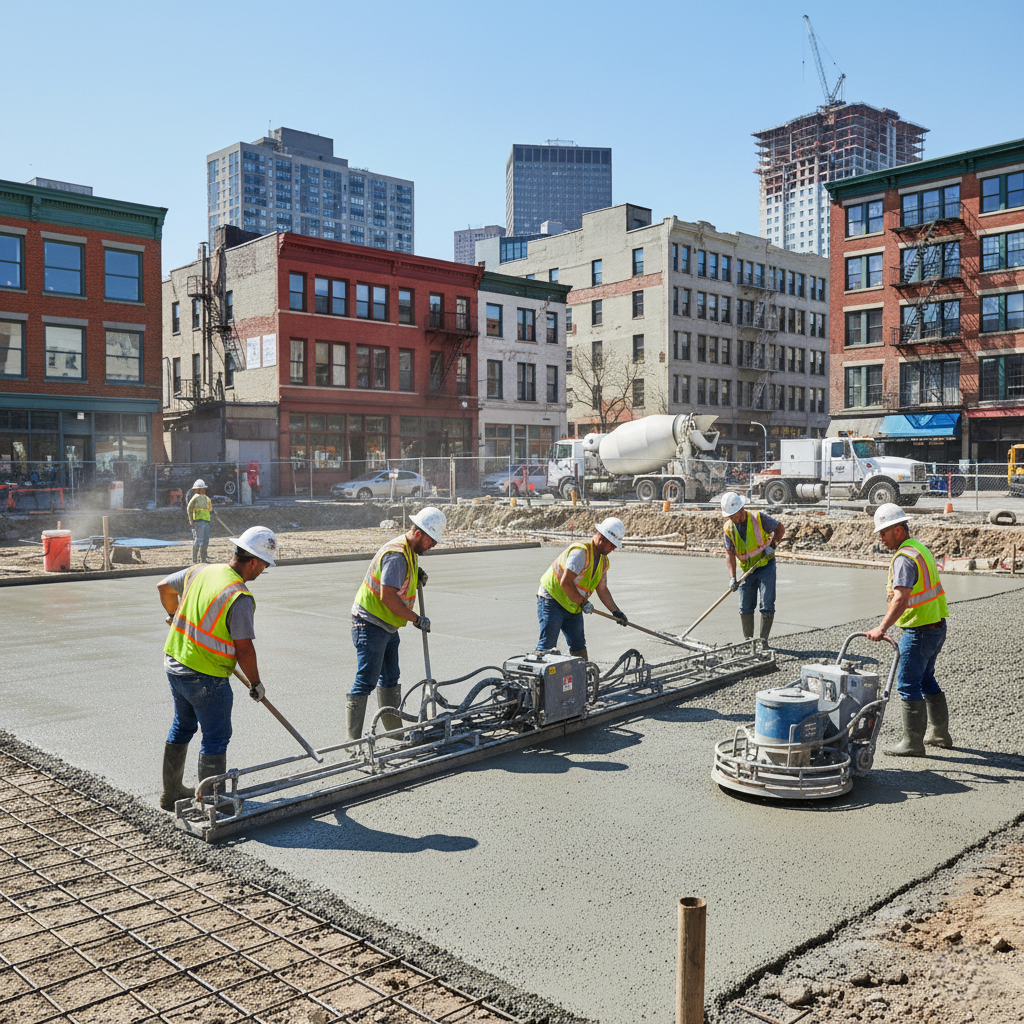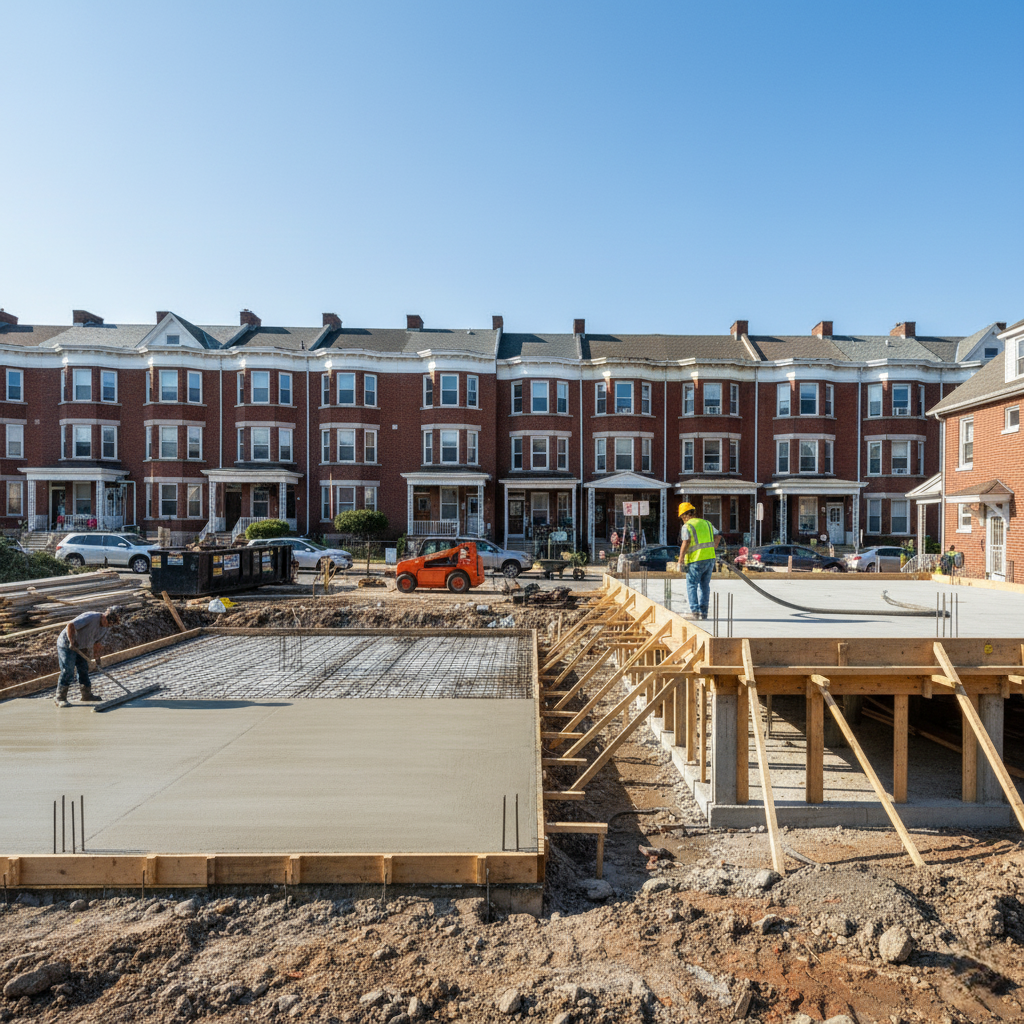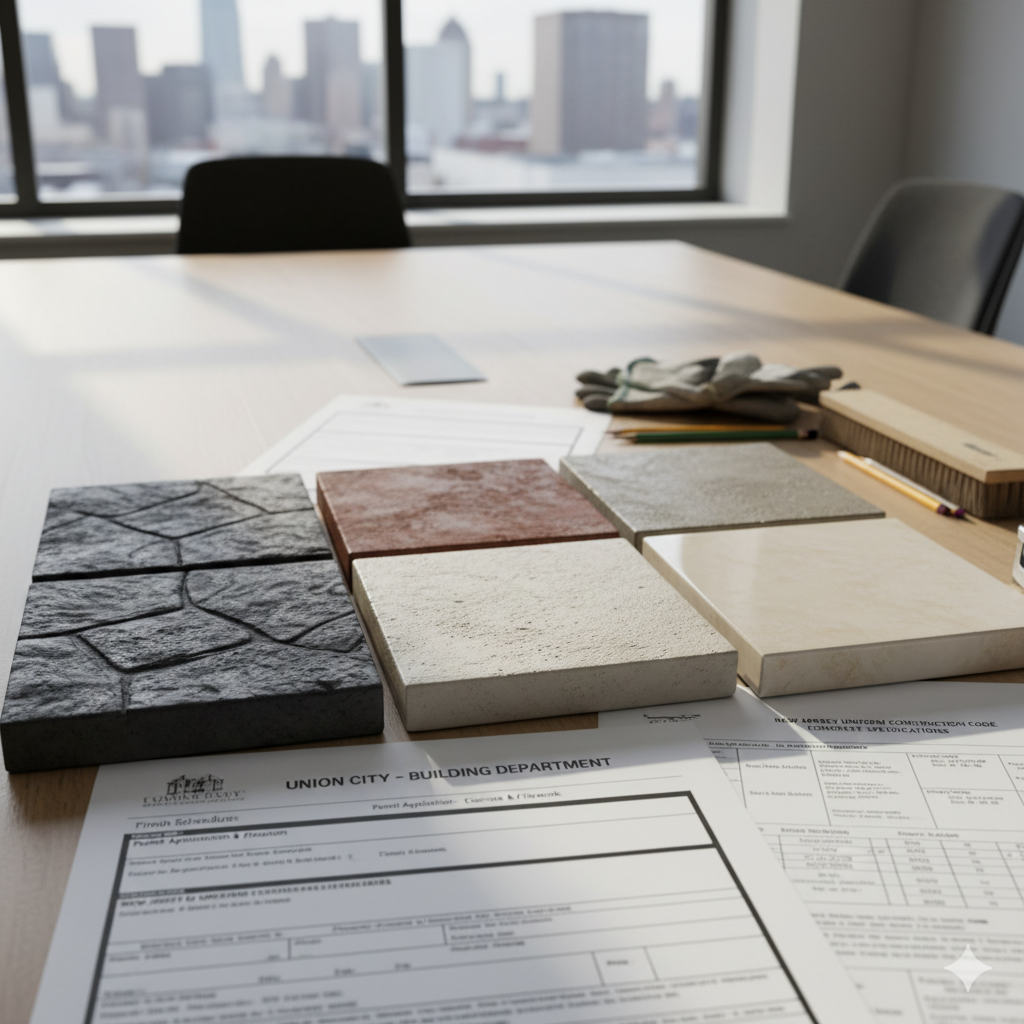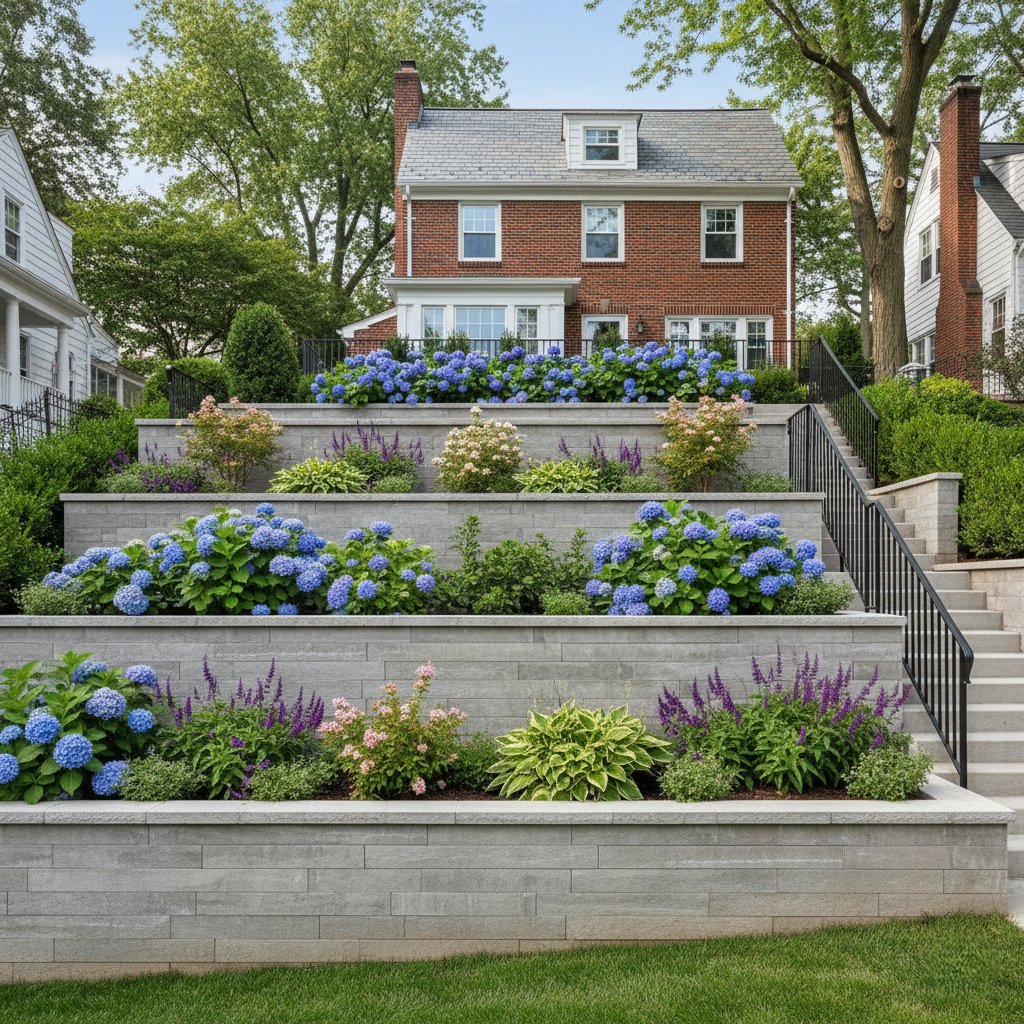
Union City, NJ Homes: Concrete Slab Foundation vs Elevated Slab
Concrete Slab Union City
The selection of whether to use an elevated slab system or a conventional concrete slab foundation is one of the most important decisions a homeowner will have to make when they are either going to build a house or do a major renovation in Union City. This is because the type of foundation selected can affect every phase of the process, including the construction costs, time, future maintenance, and how much flooding will occur. Due to its proximity to waterways, high population density, and topography, Union City has some unique problems that will impact the type of foundation to select. As such, local building codes, geotechnical conditions (soil), and climatic considerations all play an essential role in selecting the most suitable foundation design for the property. Informed decisions based on understanding both the benefits and disadvantages of each system will help homeowners obtain an economical, durable, and compliant structure to support their home for the entire life cycle of the project.

Traditional Concrete Slab Foundations
The slab is poured as a solid, monolithic slab, usually 4 to 6 inches thick, and includes footings around the perimeter of the house to provide additional structural support. Slab-on-grade systems are a good choice for single-story homes and additions in Union City because much of the area has stable soil, which allows for the use of slab-on-grade systems. One of the best features of slab-on-grade systems is the minimal amount of excavation required to install, which results in a shorter construction timeframe and, therefore, a lower overall cost to the homeowner. However, there are limitations to slab-on-grade systems. Drainage patterns and frost protection must be carefully evaluated when considering slab-on-grade systems, as these factors will determine if the system is suitable for your area.
Timeframe for Construction and Cost Savings
A typical 1,200-square-foot home foundation can be installed with a basic slab for approximately $6,000 to $9,600, whereas an elevated system would cost approximately $14,400 to $21,600. Therefore, slab-on-grade systems are a more affordable option for homeowners who do not require the added features of an elevated system. The construction timeframe for slab-on-grade systems is typically 3 to 5 days, from start to finish, depending on the size of the slab and whether the slab is being finished with flooring material at the same time. The fast construction timeframes associated with slab-on-grade systems enable homeowners to get back into their homes quickly after completion of the project, minimizing disruption to neighbors and traffic patterns. Since slab-on-grade systems do not require the extensive formwork and stem walls that elevated systems require, the material list is shorter for slab-on-grade systems, resulting in a lower overall cost.
Raised Concrete Slab Systems
Raised slab foundations elevate the primary living area of the home above the grade by utilizing stem walls, piers, or other forms of supporting structures before installing the raised slab. There are many advantages to raised slab foundations, including:
- Greater resistance to flooding
- Greater accessibility to utilities
- Improved ventilation below the raised slab
Homeowners located in Union City in low-lying areas or subject to high water tables may find raised slab foundations to be beneficial in that they provide greater flood resistance. Additionally, raised slabs are advantageous for homeowners who wish to complete plumbing, electrical, and HVAC work under the raised slab without having to cut the concrete to access the components underneath the slab.
Flood Resistance and Compliance
Due to Union City’s proximity to numerous waterways and urban drainage systems, many homeowners must consider flood protection when designing their raised slab foundation. Raised slabs inherently resist flooding by elevating living areas above water levels. In addition to flood resistance, raised slabs also provide a means of complying with Federal Emergency Management Agency (FEMA) flood zone requirements in designated areas of Union City. For example, homeowners located in low-lying areas such as Washington Park may find raised slab foundations to be advantageous due to the increased flood protection provided. As a result of their flood-resistant nature, raised slab foundations often qualify for discounted flood insurance premiums. Over time, the money saved on flood insurance can help to offset the initial construction costs of raised slab foundations.
Climate and Soil Conditions
Freeze-thaw cycles pose specific challenges to concrete raised slab foundations that must be considered during the design and construction phases of the project. Although the urban heat island phenomenon found in Union City can moderate some extreme temperatures, it does not completely negate the threat of frost to raised slab foundations. Insulation of the raised slab perimeter prevents frost from penetrating the slab and causing it to heave or become structurally unsound. Union City has varying soil conditions, ranging from stable clay soils to unstable soils that must be specially prepared. Prior to constructing a raised slab foundation, a professional should conduct a thorough soil test to determine the required depth of the foundation, the extent of reinforcement required, and the degree of sub-surface drainage needed for the site.
Drainage and Moisture Management
Regardless of whether a slab-on-grade system or a raised slab system is utilized, effective drainage is critical to the longevity of the foundation. Effective drainage is particularly critical for slab-on-grade systems. Because much of Union City is comprised of impervious surfaces and concentrates stormwater flow, effective drainage can be difficult to accomplish. Properly designed site grading can direct stormwater away from the foundation, and sub-surface drainage systems can remove excess moisture from beneath the slab. Vapor barriers applied to the underside of the raised slab prevent moisture migration through the concrete, thereby eliminating the possibility of excessive humidity and mold growth inside the home.
Access to Utilities and Maintenance
In terms of access to utilities and ease of performing future maintenance activities, there is a significant difference between slab-on-grade systems and raised slab systems. With slab-on-grade systems, utilities must be embedded within or beneath the slab, making any modifications to the slab extremely expensive and inconvenient. On the other hand, raised slab systems allow utilities to be installed beneath the raised slab, allowing for easy access to perform repairs, upgrades, or modify the utilities as needed. Many homeowners in Union City are faced with updating aged utilities that can be accomplished more easily with raised slab foundations. Specifically, HVAC systems benefit from being installed on top of a raised slab foundation, as it reduces energy consumption and reduces the amount of noise transmitted into the home.
Long-Term Maintenance and Modification Costs
There are significant differences in the long-term maintenance costs of slab-on-grade systems and raised slab systems. In general, slab-on-grade systems require less maintenance since they are protected from weather exposure and pest infestation. However, any repair activity typically requires significant expense to cut through the slab and limited access to the repair location. Conversely, raised slab systems require occasional inspections of the support structures and protection of exposed components, but typically require less expense for most repair activities. In addition, raised slab foundations typically reduce the cost of modifying and expanding a home, as new utilities and structural connections can be made to the existing system.
Building Codes and Permits
All foundations constructed in Union City must comply with New Jersey’s Uniform Construction Code (UCC), which sets forth specific requirements for design, reinforcement, and installation of foundations. Regardless of the type of foundation selected, all must meet minimum concrete strength requirements of 2,500 to 3,000 PSI and contain sufficient reinforcement to meet structural loads and seismic considerations. Depending on the type of foundation selected, permit requirements may vary, with elevated systems requiring additional engineering reviews and inspections. In addition, elevated foundation designs must be certified by a licensed engineer or architect in flood-prone areas to ensure compliance with FEMA regulations. Typically, a 2-to-4-week turnaround period exists for building department approvals, regardless of the type of foundation selected.
Resale Value and Marketability
The type of foundation used can impact the resale value and marketability of the property, particularly in areas where flooding is a concern or soil conditions are difficult to build upon. Elevated foundations tend to command a premium price due to their ability to resist flooding and the convenience of accessing utilities. As a result, elevated foundations are viewed as desirable investments for homeowners in Union City seeking to maximize the resale value of their home. In addition, insurance companies view elevated foundations as a preferred method of protecting a home from flooding, thereby providing lower flood insurance premiums to homeowners who install elevated foundations, which is another factor that impacts the resale value of a home.
Design and Installation Professionals
As previously mentioned, both slab-on-grade systems and raised slab systems must be professionally designed and installed to ensure the structural integrity of the foundation, compliance with applicable building codes, and long-term performance. Contractors with experience in constructing foundations in Union City are knowledgeable about the soil conditions and drainage patterns present in the area, as well as local building regulations that dictate the type of foundation that should be selected for the specific site conditions, budget, and long-term needs of the homeowner. Qualified contractors will conduct a full site evaluation, including soil testing, drainage assessments, and flood zone evaluations, to identify the most suitable type of foundation for the homeowner’s specific property and construction goals. Union City Concrete Works is experienced in both slab-on-grade and raised slab foundations and will assist homeowners in selecting the most suitable type of foundation based on the site conditions, budget, and long-term needs of the homeowner.



